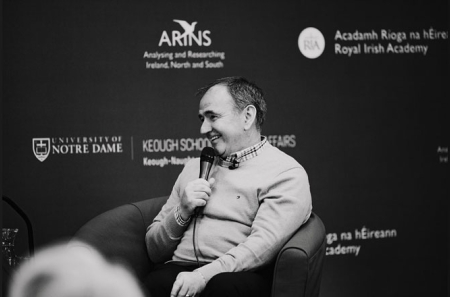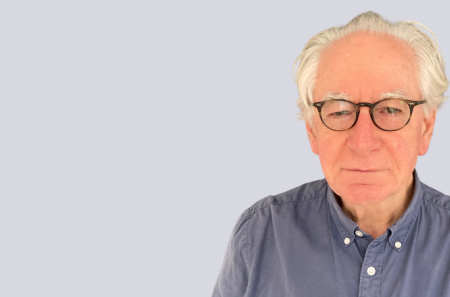
Is Northern Ireland fading from view?
20 July 2023Gordon Peake
I thought of the writer Finnoula O’Connor and her wonderful 1993 book In Search of a State when surveying the thin pile of newspapers at a sweetshop in Leitrim, a few kilometres south of the border one day in late June. In the book, O’Connor relates the story of a Catholic from Northern Ireland holidaying just over the border who goes looking for a copy of The Irish News only to find the newsagent doesn’t stock the paper. The Irish News is the paper of northern nationalists and O’Connor spins its absence as a parable about just how tangibly different ‘the South’ feels.
When I read the book first, the story captured in print for the first time an important part of my relationship with different parts of the island. Irrespective of religious and national identity, for this Northern Irish Catholic, the South always felt somewhat different from and out of sight from me, shed of familiar mainstays such as The Irish News. Heck, even the Tayto crisps looked and tasted different south of the border.
To be sure, newspaper stacks are thinner compared to 1993 when O’Connor published her book, but her observation was still accurate that clammy late June day I was passing through. About ten Irish Times, double that in Irish Independents (or ‘Indos’,) but not a copy of The Irish News to be had.
Such uncoupling– if indeed that is the right word as it presumed there was a coupling at some point - may only have become more pronounced over time. It’s certainly one of the main themes I took from the ARINS Irish Times survey and coursed through conversations I’d had the few days prior to me staring at the newsagent’s rack. I’d been in Galway hanging out with old school friends to commemorate the turning of our half-centuries. Rendering us a band of older voters in Lucid Talk survey demographic speak, and more likely to identify with Europe than younger voters in Northern Ireland. Some of the gang like me, no longer live on the island, others went South, others stayed North. One friend who lives just outside Belfast – moderate of persuasion, normally – was saying that the miscellanea of arches and flags sprouting from every lamppost in his town was putting him in mind to vote for unification in a border poll. Our two friends who live south of the border didn’t seem enamoured of the idea. Immoderate of persuasion, normally, the idea that the place they left would join the place they moved to engendered lukewarm enthusiasm. In survey terms they’d need some persuading.
I bought a copy of the Guardian instead and noticed an absence there too. Whereas in O’Connor’s 1993 there would reliably be a story about Northern Ireland daily, on this day there was none. And upon doing some research I discovered that wasn’t particularly unusual. There were less than ten Northern Ireland stories in the Guardian in all of June.
And this was not just an anomaly for that calendar month. Google searches for phrases such as ‘Northern Ireland peace process’ from 2004 (when data started to be collected) show that, apart from a small spike during Brexit negotiations, the trend is resolutely downwards. In the average month in 2005, there were more than 30 times as many mentions of ‘Northern Ireland peace process’ as there were in a typical month in 2022. While the specific search term may have been too restrictive, the trend line seems clear. This part of my once island home feels fading from view, on a trajectory to join the likes of Biafra, Angola and Timor-Leste, places where klieg lights of attention used to shine bright in previous decades but now no more?

Fig. 1 Relative interest in Northern Ireland Peace process on Google. See attached file (top right of this page) for full data taken from Google Trends on 4 July 2023.
As I drove on up the road, reflecting on how my own upbringing during the Troubles must in some indelibly way contributed to a career working in or around conflict, it struck me that there is dwindling attention to Northern Ireland in this respect too. Is the province still a case study and inspiration for the resolution to other conflicts? It’s hard to see it in the everyday. Though the Europa occasionally hosts long-serving peacebuilders unpuzzling the legacies of divided societies, gone are the days Northern Ireland’s politicians would be flying hither and thither articulating lessons and drinking in acclaim for the sagacity of their contributions. I remember meeting a now late politician in the early 2000s at a conference in Derry/Londonderry lamenting how difficult it was to co-ordinate a trip to Harvard, Bogota, and Famagusta before heading on to deliver a keynote in South Africa. Few of his contemporaries would have similarly punishing schedules.
And is this trend of fading from view present in academia and policy research too? In the late 1990s and 2000s it felt like an edited volume on conflict management or resolution could not be published without Northern Ireland featuring. While of course, there’s a possibility I was plugging in the wrong keywords the trendline here seems downwards.
There’s two ways of thinking of this inattention. The first is positive. Northern Ireland receding from the limelight is a good thing, a settling back into the natural order of other regions in the isles. The other, downbeat, is what I thought when I eventually tracked down an Irish News, in a newsagent over the border, in a little town festooned with bunting and a new arch with King William on his white horse and King Charles looking stooped in military regalia. The headlines were of giant bonfires being laid, effigies being erected, two stories of stalemate in efforts to get the political institutions up and running again, institutions which, in the last five years at least, are more likely inert than active. The price of political inertia at home is manifest in our international media as Bakhmut replaces, Belfast, Mariupol replaces Magherafelt. The thought that danced in my mind when I hopped back in the car, was this, what are we Northern Irish paying attention to these days when no-one is paying us any attention?
With thanks to Terence Wood of the Australian National University for assistance in Google searching.
Gordon Peake is Senior Adviser, Pacific Islands at the United States Institute of Peace. He is the author of Beloved Land: Stories, Struggles and Secrets from Timor-Leste, and Unsung Land, Aspiring Nation: Journeys in Bougainville.



